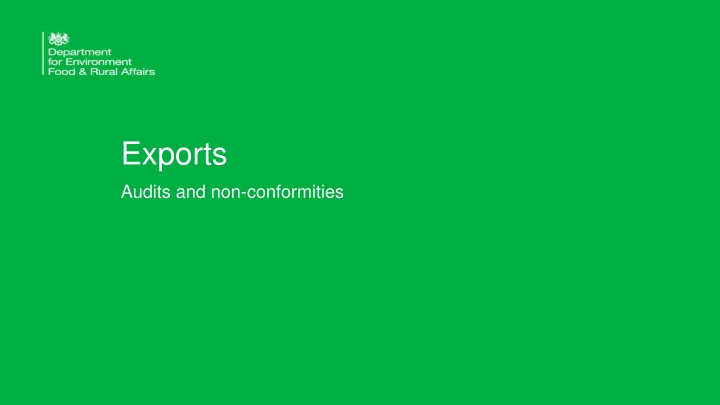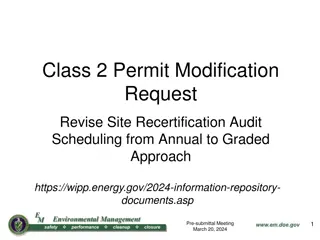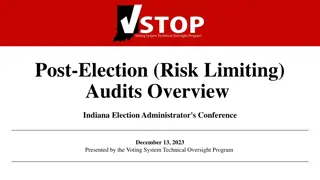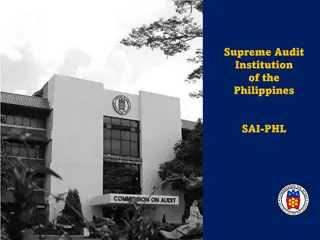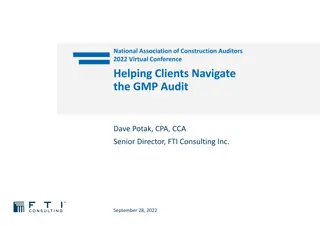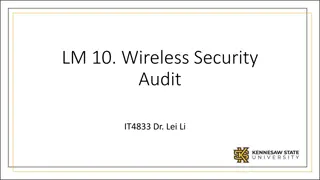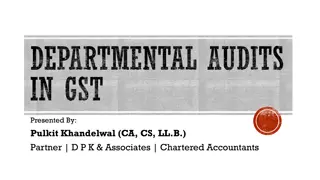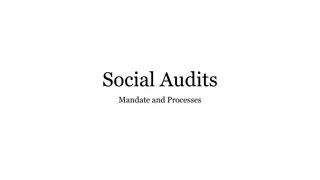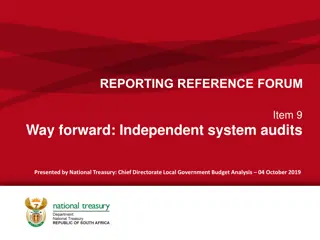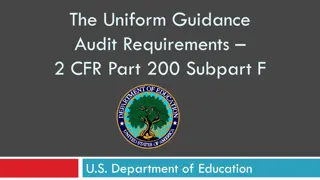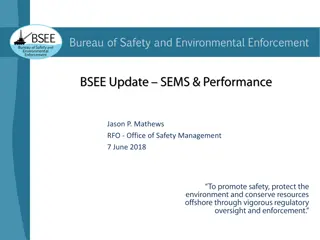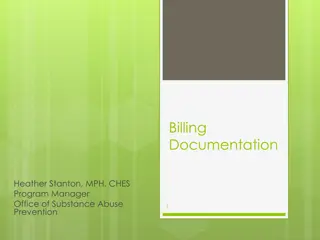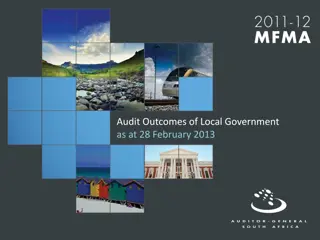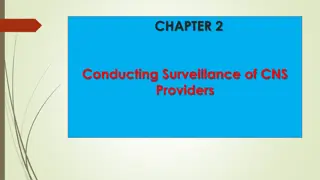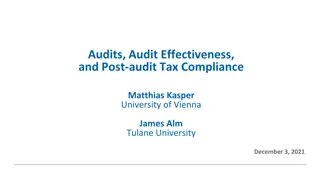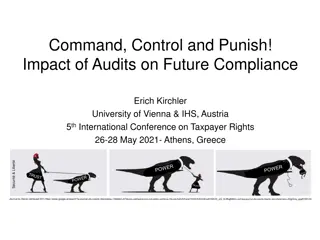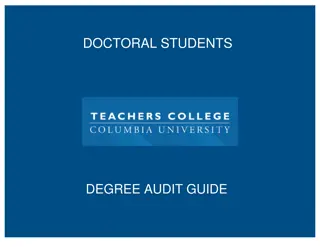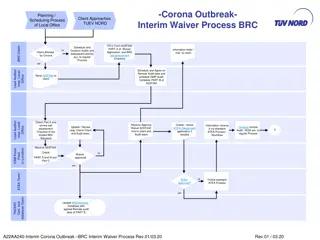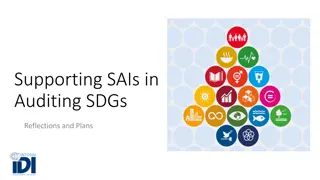Audits and Non-Conformities Overview
This content provides valuable insights into how audits are conducted to ensure compliance with plant health schemes, along with addressing non-conformities. It covers the process of audits, frequency, types of non-conformities, actions taken upon identification, and the appeal process. Additionally, it highlights the role of APHA inspectors in auditing export sites and authorized personnel, emphasizing the importance of adherence to scheme rules to maintain plant health integrity.
Download Presentation

Please find below an Image/Link to download the presentation.
The content on the website is provided AS IS for your information and personal use only. It may not be sold, licensed, or shared on other websites without obtaining consent from the author.If you encounter any issues during the download, it is possible that the publisher has removed the file from their server.
You are allowed to download the files provided on this website for personal or commercial use, subject to the condition that they are used lawfully. All files are the property of their respective owners.
The content on the website is provided AS IS for your information and personal use only. It may not be sold, licensed, or shared on other websites without obtaining consent from the author.
E N D
Presentation Transcript
Exports Audits and non-conformities 1
Content You will know how audits are carried out to check your compliance with the scheme, and how non-conformities are addressed
International plant health learning objectives Understand: What will happen at an audit The frequency of audits and how non-conformities affect this What a critical non-conformity is What a non-critical non-conformity is The action taken if non-conformities are identified How to appeal decisions
Audits APHA Inspectors will carry out audits of both the export site (to check adherence to the BCMP) and your role as the authorised person. This will include checking inspection, export and training records, and ensuring the site continues to meet the physical requirements of the scheme. At the audit you will also be reassessed on your knowledge of export procedures, and the requirement to keep up to date with new pest and disease information.
Audits A minimum of one authorised person must be available for each audit. All authorised persons must attend and successfully pass an audit each year.
Audits An audit will be carried out based on the following frequency guide, assuming no non-conformities are identified: Weekly for the first month Fortnightly for the next month Then monthly If non-conformities are identified, more audits than the frequency above may be carried out by APHA APHA may also carry out further unannounced audits within this frequency to check adherence to the scheme rules and requirements
Audits There will be a fee for the time spent on site by the APHA inspector carrying out audits If non-conformities are identified, action will be required to correct this
Critical non-conformities A critical non-conformity is one that immediately impacts the integrity and trust in the NPPO s phytosanitary system or its elements, and requires a rapid corrective action to be identified and implemented. Examples of critical non-conformities include: Interception of a pest or disease by an import NPPO Fraudulent PC Failure to comply with phytosanitary import requirements Detection of a quarantine pest but failure to remove this pest or infected commodity from the export consignment prior to export
Critical non-conformities A critical non-conformity may result in access to the scheme being immediately withdrawn Remedial action should be agreed onsite with the APHA inspector, and put into place as soon as possible If this is not possible before the APHA inspector leaves the site then access to the scheme will be withdrawn
Critical non-conformities Exports may continue but inspections must be carried out by an APHA inspector, and in accordance with usual export service standards and subject to the relevant fees You will have the opportunity to take corrective action, and your access to the scheme may be reinstated upon completion of a satisfactory audit by an APHA inspector Your audits may then be carried out at an increased frequency to check continued implementation and effectiveness of the remedial action before the usual audit frequency resumes
Critical non-conformities Repeated or multiple critical non-conformities, or failure to take satisfactory corrective action, may result in access to the scheme being completely removed. Exports may continue but inspections must be carried out by an APHA inspector, and in accordance with usual export service standards and subject to the relevant fees If you still wish to participate in the scheme, you will need to re-apply and complete the eligibility, training and site inspection stages again.
Non-critical non-conformities A non-critical non-conformity is one that does not immediatelyor directly impact the integrity or trust in the NPPO s phytosanitary system or its elements, and is not considered a critical non- conformity. Examples of non-critical non-conformities include: Failure to be able to detect low level, quality pests Failure to maintain records Failure to hold officially inspected commodities for export separate from non-inspected
Non-critical non-conformities In cases where there are repeated non-critical non-conformities occur access to the scheme may be withdrawn Remedial action should be agreed onsite with the APHA inspector, and put into place as soon as possible If this is not possible before the APHA inspector leaves the site, a further audit will be arranged to check the remedial action has been implemented effectively. You will receive a warning email. You may continue to act as authorised person and officially inspect commodities for export under PHEATS
Non-critical non-conformities At the next audit, if the non-conformity has not been corrected, or if multiple non-critical non-conformities are identified, remedial action should be agreed onsite with the APHA inspector, and put into place as soon as possible. If this is not possible before the APHA inspector leaves the site, a further audit will be arranged to check the remedial action has been implemented effectively. You will receive a warning email. You may continue to act as authorised person and officially inspect commodities for export under PHEATS.
Non-critical non-conformities At the next audit, if the non-conformity has not been corrected, or if repeated multiple non-critical non-conformities are identified, this will be treated as a critical non-conformity. Remedial action should be agreed onsite with the APHA inspector, and put into place as soon as possible. If this is not possible before the APHA inspector leaves the site then access to the scheme will be withdrawn. Exports may continue but inspections must be carried out by an APHA Inspector, in accordance with usual export service standards and subject to the relevant fees
Non-critical non-conformities You will have the opportunity to take corrective action, and your access to the scheme may be reinstated upon completion of a satisfactory audit. Your audits may then be carried out at an increased frequency to check implementation and effectiveness of the remedial action, before the usual audit frequency resumes. Failure to take satisfactory corrective action may result in access to the scheme being completely removed. If you still wish to participate in the scheme, you will need to re-apply and complete the eligibility, training and site inspection stages again.
Appeals If you are not successful in your application to join the scheme, or if you have access to the scheme removed due to non-conformities, you may appeal the decision. You must appeal in writing to your APHA inspector The appeal will be handled by a senior APHA inspector independent from the local region, who will investigate If further information is required, you will have 21 days from the date of request to submit further evidence
Appeals While the appeal is being considered, exports may continue but inspections must be carried out by an APHA Inspector, in accordance with usual export service standards and subject to the relevant fees. The final outcome will be provided in writing. If the final outcome is removal from the scheme, if you still wish to participate in the scheme you will need to re-apply and complete the eligibility, training and site inspection stages again.
Knowledge Test Please visit the below link to and complete the knowledge test for this module: PHEATS Audits and non-conformities https://forms.office.com/Pages/ResponsePage.aspx?id=UCQKdycCYkyQx044U38RAvJ7GY98IcdOvJfSZ- UDeKFUM1NWS1dTMUNDNlk2NzZEOUQ1TzZNNVVKNC4u 20
Exports Roles and Responsibilities 21
Arrange transport and Customs declarations Export of goods Export Journeys Export Consignments will have to be exported before the end of the validity period of a PC (valid for 14 days after issue). If a consignment is not exported within 14 days, then the consignment will have to be re-inspected and a new PC issued for the consignment. The original PCs must, in the absence of agreed Covid-19 easements, travel with the consignment. Plant health regulated goods must enter through a plant health approved Border Control Post (BCP) in the EU. Your goods may be subject to checks upon arrival in the EU or NI. 22
Roles and Responsibilities The Authorised Person(s) shall: Perform official export inspections for all goods eligible under the PHEATS. Keep accurate inspection records of all inspections. Void any phytosanitary certificate issued for a consignment under the PHEATS that is subsequently not exported. Undertake training, and refresher training where applicable, and be able to demonstrate a competency, in export inspections. 23
Roles and Responsibilities The Authorised Business shall: Ensure that the Authorised Person(s) are made aware of its obligations as set out in this Agreement and the User Guide as appended to this Agreement. Ensure that the Authorised Person(s) have undertaken training, and refresher training where applicable, and be able to demonstrate a competency, in export inspections. Produce, implement and monitor a BCMP and ensure the BCMP is implemented by the Authorised Person(s). Appoint a person(s) within its organisation as a point of contact (Person(s) Responsible) for Defra, for the purposes of any matter relating to this Agreement and the PHEATS. . ensure that the Person(s) Responsible have undertaken training, and refresher training where applicable, and be able to demonstrate a competency in the implementation of the BCMP. Retain, for a minimum of 3 years, any phytosanitary certificate issued under the PHEATS that is voided by the Authorised Person(s) in accordance with the BCMP, and make it available to Defra at any time. Make and retain accurate records and information for the purposes of implementing the BCMP and any records otherwise related to the PHEATS. 24
Roles and Responsibilities The Authorised Business and Authorised Person(s) may disclose Confidential Information which it receives from Defra in any of the following instances: Where disclosure is required by applicable law, permitted in respect of an audit, or required by a court with the relevant jurisdiction if the recipient Party notifies the disclosing Party of the full circumstances, the affected Confidential Information and extent of the disclosure; If the Authorised Business already had the information without obligation of confidentiality before it was disclosed If the information was given to it by a third party without obligation of confidentiality; If the information was in the public domain at the time of the disclosure; To its auditors or for the purposes of regulatory requirements; On a confidential basis, to its professional advisers on a need-to-know basis; To the Serious Fraud Office where the recipient Party has reasonable grounds to believe that the disclosing Party is involved in activity that may be a criminal offence under the Bribery Act 2010. 25
Conflict of Interest The business must take action to ensure that neither the Authorised Person(s) nor any of its other staff are placed in the position of an actual or potential conflict between the financial or personal duties of the Authorised Business or its staff and the duties owed to Defra under the scheme, in the reasonable opinion of Defra. The business must promptly notify and provide details to Defra if a conflict of interest occurs or is expected to occur (with the exception of the conflict arising from the employment of the Authorised Person(s) by the business), or if there are any matters that will inhibit the Authorised Person(s) ability to carry out its duties under this scheme or the performance of the delegated function (i.e. official inspections) impartially. The Authorised Person(s) must act impartially and free from any actual or potential conflict between any of its other duties and the performance of the inspections under the scheme, in the reasonable opinion of Defra. The Authorised Person(s) must promptly notify and provide details to Defra if a conflict of interest occurs or is expected to occur (with the exception of the conflict arising from the employment of the Authorised Person by the business), or if there are any matters that will inhibit the Authorised Person(s) ability to carry out its duties under this scheme or the performance of the inspections impartially. Should an Authorised Person(s) or PR feel as though the integrity of the phytosanitary inspection has been influenced or could be potentially influenced, this can be reported anonymously, to the below email address: pheats@apha.gov.uk 26
Further Resources There are a multitude of resources available for you, should require any further information. UK Plant Health Portal - https://planthealthportal.defra.gov.uk/ UK Plant Health Risk Register - https://secure.fera.defra.gov.uk/phiw/riskRegister/ GOV.UK - https://www.gov.uk/guidance/plant-health-controls#exporting CABI - https://www.cabi.org European Plant Protection Organisation (EPPO) - https://gd.eppo.int/ European Commission: Plant health & biosecurity https://ec.europa.eu/food/plant/plant_health_biosecurity_en Eur-Lex - https://eur-lex.europa.eu/homepage.html 28
